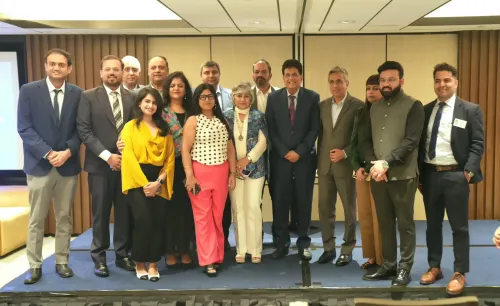How Did a Man End Up Hospitalized After Following Dangerous Diet Advice from ChatGPT?

Synopsis
Key Takeaways
- Bromide poisoning can have severe health consequences.
- AI-generated advice should not replace professional medical guidance.
- Always verify health recommendations with qualified experts.
- Be cautious when following dietary advice from unverified sources.
- This case illustrates the potential risks of relying on AI for health-related information.
New Delhi, Aug 10 (NationPress) In a shocking and rare incident, a man residing in the United States suffered from life-threatening bromide poisoning after adhering to diet recommendations provided by ChatGPT.
Medical professionals speculate this may be the first documented case of AI-related bromide poisoning, as reported by Gizmodo.
The details of this case were published by physicians at the University of Washington in the 'Annals of Internal Medicine: Clinical Cases'.
According to their report, the individual ingested sodium bromide for three months, mistakenly believing it was a harmless alternative to chloride for his diet. This recommendation allegedly came from ChatGPT, which failed to caution him about the associated risks.
Bromide compounds were previously utilized in medications for anxiety and insomnia but were prohibited decades ago due to significant health hazards.
Currently, bromide is primarily found in veterinary pharmaceuticals and specific industrial products. Cases of bromide poisoning, also referred to as bromism, are exceptionally rare in humans.
The man initially visited the emergency department, convinced that his neighbor was attempting to poison him. Though many of his vital signs appeared normal, he exhibited symptoms of paranoia, resisted hydration despite thirst, and experienced hallucinations.
His condition escalated into a psychotic episode, prompting doctors to place him under an involuntary psychiatric hold.
After receiving intravenous fluids and antipsychotic medications, his health began to improve. Once stabilized, he revealed to the doctors that he had consulted ChatGPT for alternatives to table salt.
Regrettably, the AI had suggested bromide as a safe choice, advice he followed without realizing the potential dangers.
While the medical team did not have access to the man's original conversation records, they later inquired with ChatGPT using the same question and found that it again mentioned bromide without issuing any warnings about its safety for human consumption.
Experts emphasize that this incident underscores how AI can disseminate information without appropriate context or awareness of health risks.
After spending three weeks in the hospital, the man made a full recovery and was in excellent health during a follow-up appointment. Medical professionals have cautioned that although AI can facilitate the accessibility of scientific information, it should never substitute for professional medical advice. As this case illustrates, it can sometimes offer perilously inaccurate guidance.







